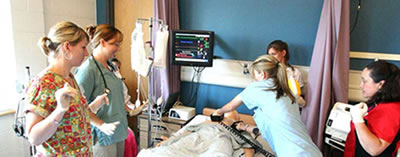Province-wide access to learning from a combination of online theory simulation and hands-on experience
Opportunity
In 2007, the Ontario Ministry of Health and Long-Term Care issued a Request for Proposals to hospitals, colleges, and universities for the development of an online program for critical care nursing. After a rigorous competition, Durham College in Oshawa was awarded $1 million to set up and offer the program.
The world-wide shortage of nurses is particularly acute in critical care, which also has high levels of turnover. Entry-level nurses need additional theoretical and practical learning to acquire the skills to transition into this highly demanding, fast paced practice area.
Through the online program, the opportunity for learning about critical care nursing and receiving graduate qualifications is now available to nurses across the province and throughout the country. Durham College designed and implemented a Critical Care Nursing E-Learning Graduate Certificate Program that is provincially-recognized and developed to national and provincial standards.
Innovation
The Critical Care Nursing E-Learning Graduate Certificate Program has three key components:
- Six interactive theoretical courses offered via the Internet;
- Practical experience in an intensive critical care simulation lab;
- Hands-on preceptored (monitored) experience in an intensive care unit (ICU).
Online courses: The students are all registered nurses. Six online courses are offered, five of them providing critical care theory and one offering an introduction to e-learning. Students have eight months to complete the six courses, but can finish in a shorter time period as the courses are self-paced. The students have to complete all six courses before they can begin the practical components. If they are unable to complete a course in the time allotted, they can re-register.
Online resources for student learning include interactive learning objects, audio, visuals, podcasts, activities, and online assessments. The accompanying text books supply the detail so that the online modules are not text-heavy. Each online course has a teacher, a highly experienced critical care nurse educator who may be anywhere in Ontario, who supports, monitors and encourages student progress.The faculty in this program are all prepared at the graduate level in nursing and in addition hold national certification in Critical Care credentials.
The online curriculum is re-examined every year to ensure that it reflects current guidelines and that students are learning the best and the latest practices.
Simulation Lab: Durham College has partnered with nine colleges and universities in Ontario to offer the simulation lab which takes place over two weekends. Each facility has a high-tech lab with very life-like patient simulators that replicate the needs of critically ill adults. Case-based scenarios are used, simulating respiratory, cardiac, neurological, and other crises. Each student must reach all of the required competencies in the simulation lab.
Durham College trained the faculty working in the simulation labs in the partner institutions to ensure consistency of curriculum, practice, and assessment. Having simulation labs around the province greatly increases accessibility as students can go the lab closest to home.

The Simulation Lab at Durham College
This program is designed for students with previous education. Please see the entrance requirements section of this page for more detail.
Experience in an ICU: After completing the online courses and the lab simulation, each nurse has to complete 120 hours of hands-on preceptored (monitored) experience in a critical care unit. This practicum is arranged by Durham College and is guided and monitored by hospital nursing staff. Faculty advisors from Durham, all of whom are practicing critical care nurses, work with the preceptors as they support the nurses in the application of what they have learned.
Durham College developed an online workshop for the preceptors who work with the students in the intensive care units. Four online modules feature video vignettes with questions to help the preceptors function effectively in their role.
Outcomes and Benefits
The students have responded very positively to the program, with almost 100% saying they would recommend it to other nurses. The hybrid learning model allows them to balance work, study, and life.
The students have benefitted from the self-paced nature of the online courses as they increase their confidence and discipline. Employers have remarked on the improvements in practice resulting from the compressed period of theoretical learning, simulation preparation, followed by intense practical application.
Durham College has three class intakes a year, with 80 to 100 students each time. The students now come from all over Canada.
Although the program was designed for recently-graduated nurses, experienced nurses have also benefitted from taking it, as critical care graduate certification was not previously available in this format.
The program is unique in Ontario, has been recognized internationally and used as a model for development of similar approaches.
Challenges and Enhancements
Keeping in touch with the students, maintaining open communication, and supporting learning have been ongoing challenges. The hospitals that employ the nurses are also looking for guidance on how they can support the nurses while they are taking the online courses.
The front-end development work was extremely demanding and involved the coordination and collaboration of critical care subject experts, the Centre for Academic and Faculty Enrichment at Durham, library staff, information technology experts, vendors, publishers, and other partners.
Potential
Durham College is considering offering the program internationally, with the requirement for the nurses to come to a Canadian facility for the lab simulation component. More simulation lab partners may also be set up in Ontario, and possibly across Canada, to respond to the increasing demand for the program.
Sandra Goldsworthy, Co-ordinator of the program, is willing to discuss the details of the program including the hybrid learning model that has been developed, the research that is underway on the translation of the learning from the courses and the simulation lab into the practice setting, and on the retention rates of the nurses who have completed the program.
For Further Information
Sandra Goldsworthy
Co-ordinator
Critical Care Nursing Graduate Certificate Program
Durham College, Oshawa
[email protected]


